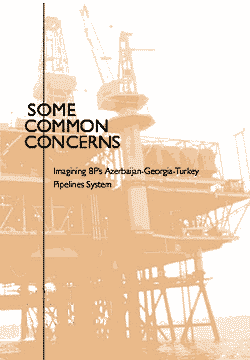Some Common Concerns
Imagining BP's Azerbaijan-Georgia-Turkey Pipelines System
by James Marriott and Greg Muttitt of PLATFORM
|
What's the Story ?
BP intends to begin construction on a proposed pipelines system in spring
2003, that would run from the offshore oil and gas fields of Azerbaijan in
the Caspian Sea, to the southern shores of Turkey on the Mediterranean via
Georgia.
|

- The pipelines would pass through or near seven different conflict zones. They would lead to the creation of a 1,000-mile militarised corridor through three countries that are known for their poor human rights record
- They would cause economic and physical disruption to hundreds of communities along the route, while delivering no energy to them: despite the severe energy poverty in region, the oil and gas would all be destined for the West. They would require the confiscation of people's land, often without compensation
- They would transport oil and gas whose impact on climate change would be equivalent to more than the pollution from every power station in the UK
- They would pass through a region of northern Turkey which suffers from severe seismicity, where earthquakes have been known to level whole cities. Three supertankers per day would leave the port of Ceyhan in Turkey, threatening the viability of fishing in the area, and the unspoilt Turkish Mediterranean coast
- Contracts already signed between BP and the three host governments have been described as 'colonial', as they threaten to bypass social, environmental and other domestic legislation, giving effective sovereignty to BP and its partners
- They would be subsidised by the British taxpayer, through the Export Credit Guarantee Department and other financial institutions
Some Common Concerns helps the reader to imagine what the
proposed Azerbaijan-Georgia-Turkey (AGT) pipelines system would be
like if it were built. The book recounts the 13 years
of planning, the political positioning of the three host countries (and
crucially of the USA and Britain), the strategic manouevring of BP and its
partner companies. The book examines the experience of BP's three biggest
existing pipeline systems, in the North Sea, in Alaska and in Colombia -
and asks whether the similar patterns of environmental damage, human rights
issues, economic injustices can be expected from the AGT pipelines system.
By creating a picture of the proposed pipelines system, and the complex
network of organisations backing it (led by BP), the book aims to help
members of civil society and campaigners actively influence decisions about
the project.
What's the Difference ?
Some Common Concerns is a groundbreaking publication in terms of approach:
- it is precautionary in that it raises the question of whether such a
pipelines system is advisable BEFORE it is actually built
- it is dynamic in that it fuses detailed research with a strong and
compelling detective narrative
- it is a beautifully designed book, not a stack of stapled A4
- it is intended to be read with excitement, not just for the desk and the
magazine box, but for the sofa, in bed, on the bus, and the bookcase; not
only the concerned expert, but also for the engaged general reader
To obtain a copy, please send a cheque for £11.50 (incl p&p), made out to 'THE ILISU DAM CAMPAIGN', to:
Baku-Ceyhan Campaign
c/o Ilisu Dam Campaign
Box 210
266 Banbury Road
Oxford OX2 7DL
Tel: 01865 200 550
- – Email: baku@gn.apc.org
NOTE. A Summary booklet of Some Common Concerns is available in Georgian,
Russian and Turkish, and has been distributed strategically along the
pipelines route.
Designed by The Argument by Design
Written and researched by James Marriott and Greg Muttitt of PLATFORM,
the book is published by the organisations which make up the Baku-Ceyhan Campaign coalition:
PLATFORM
The Corner House
Friends of the Earth International
Campagna per la Riforma della Banca Mondiale
CEE Bankwatch Network
Kurdish Human Rights Project
|
|

